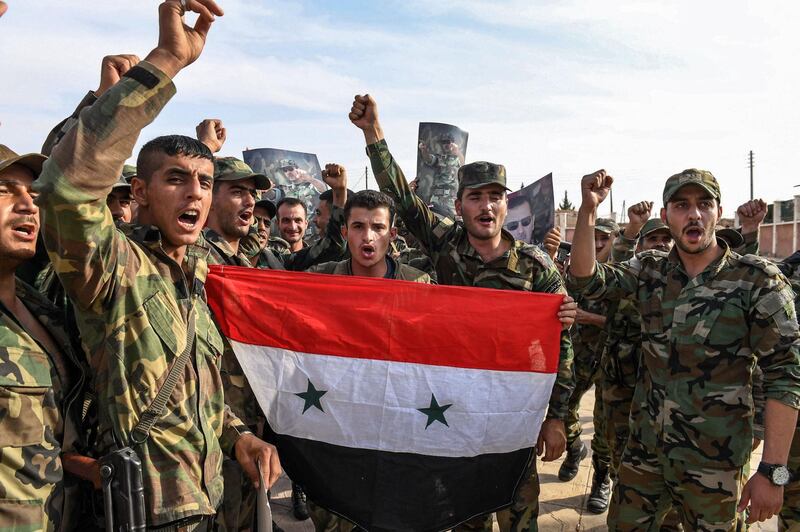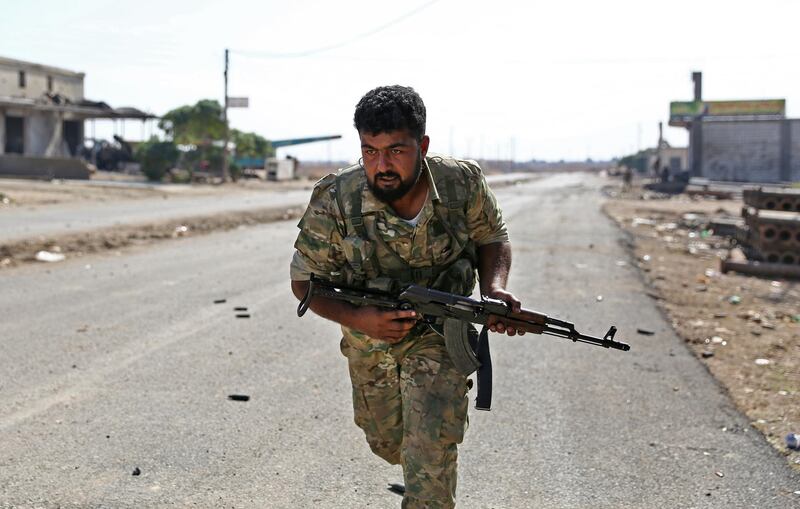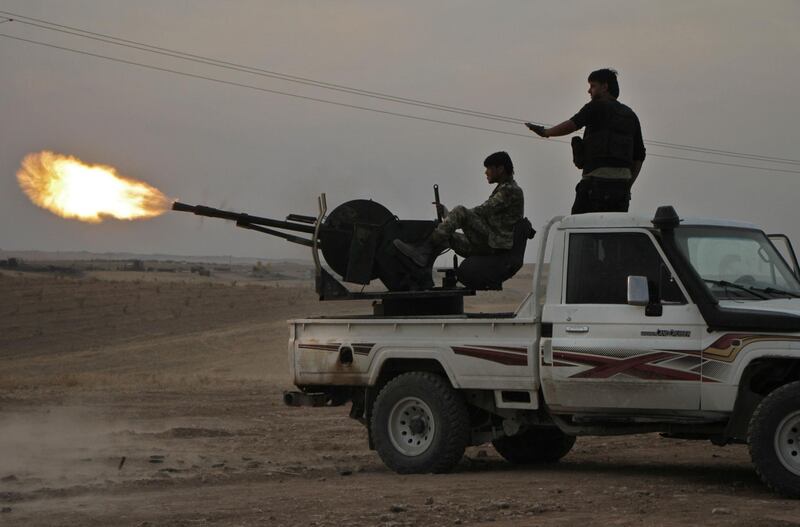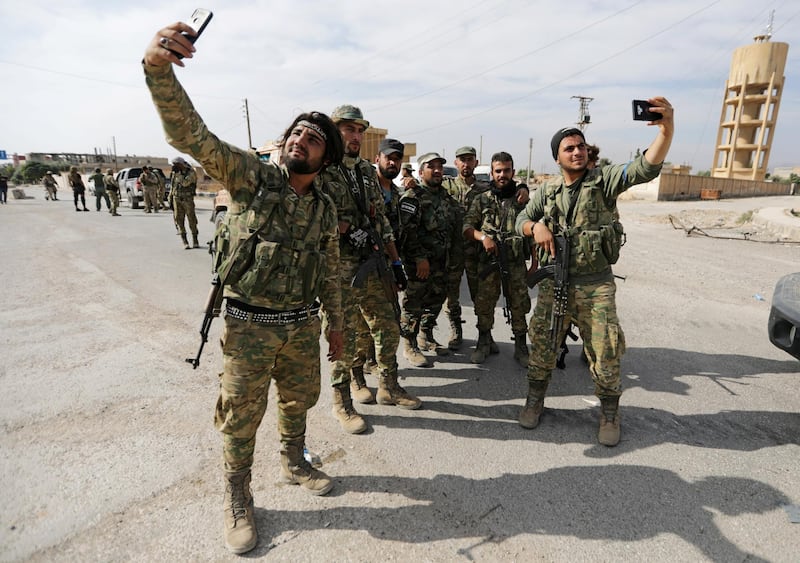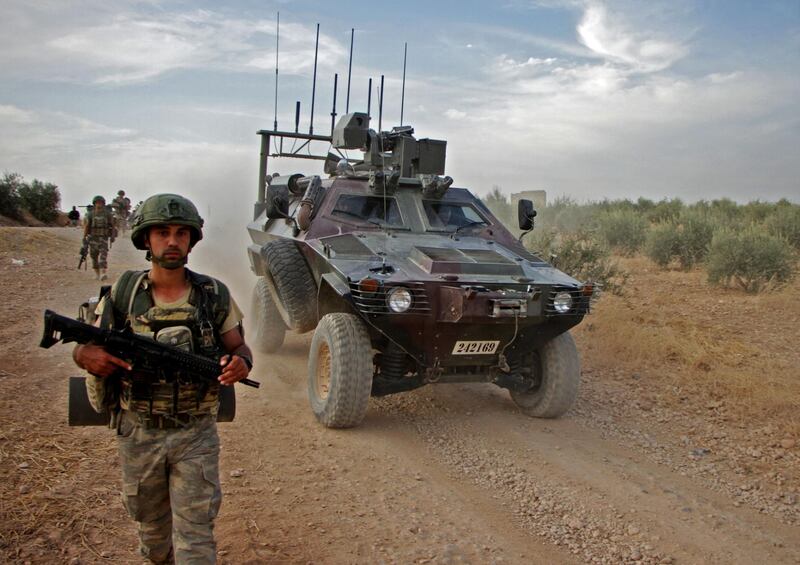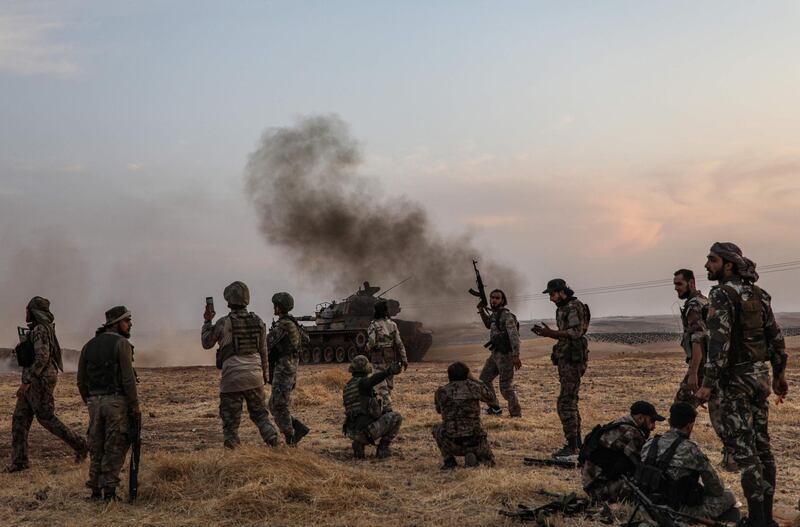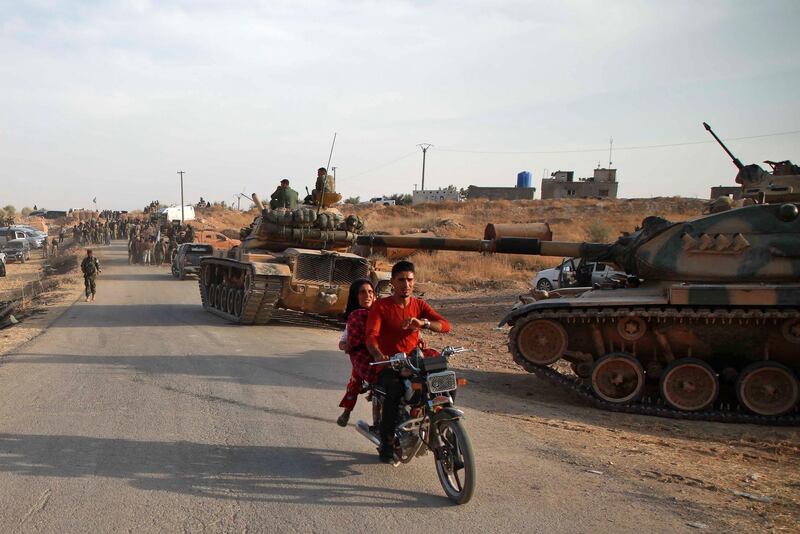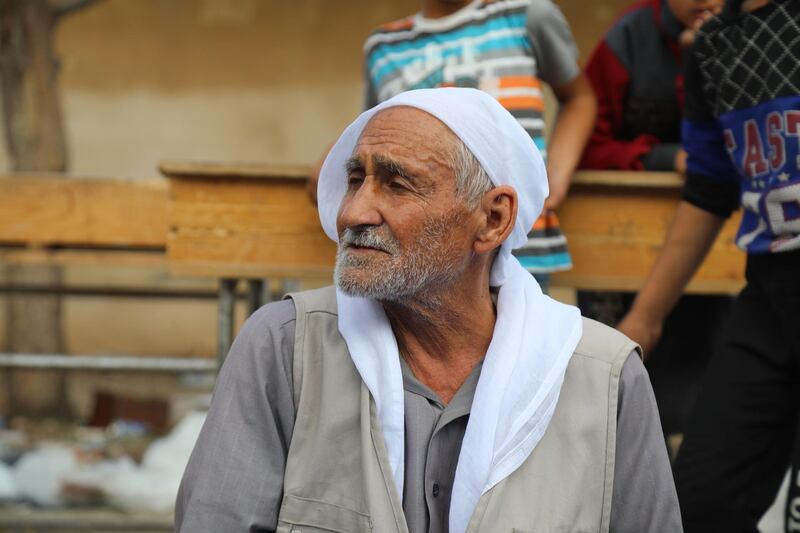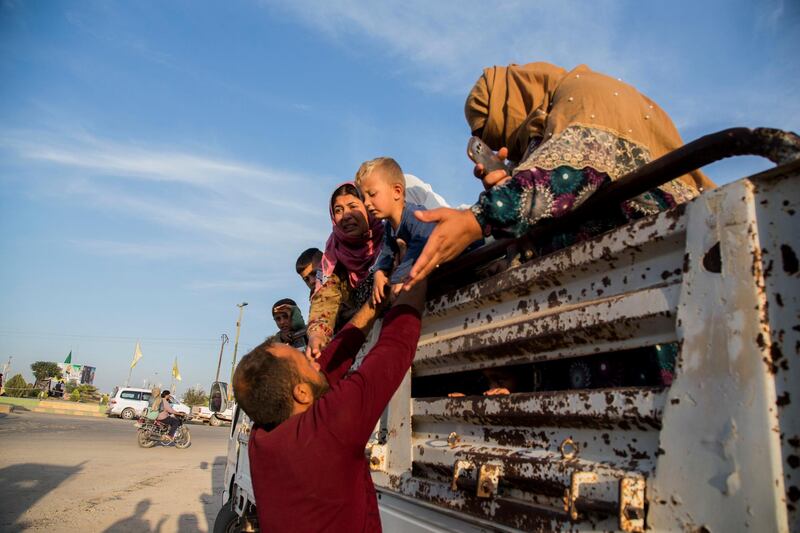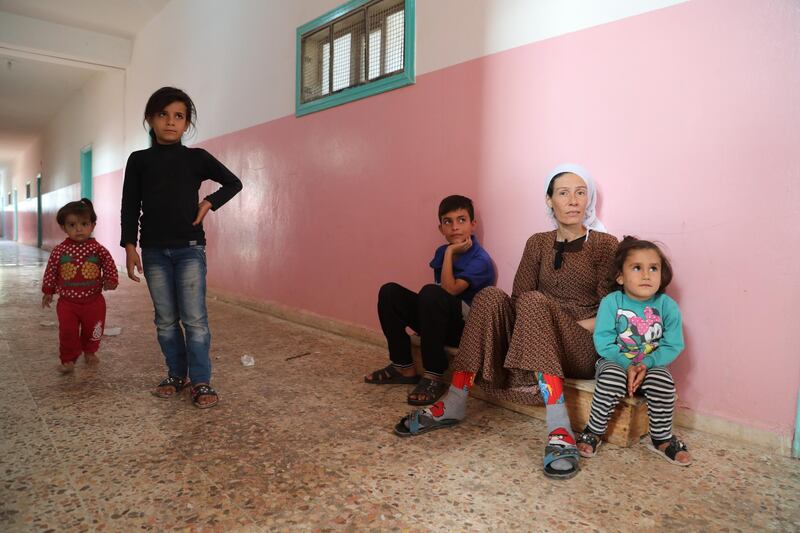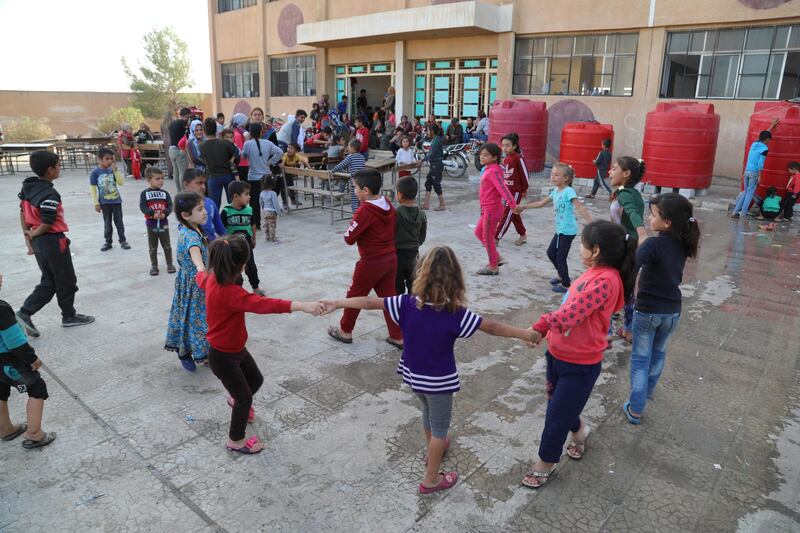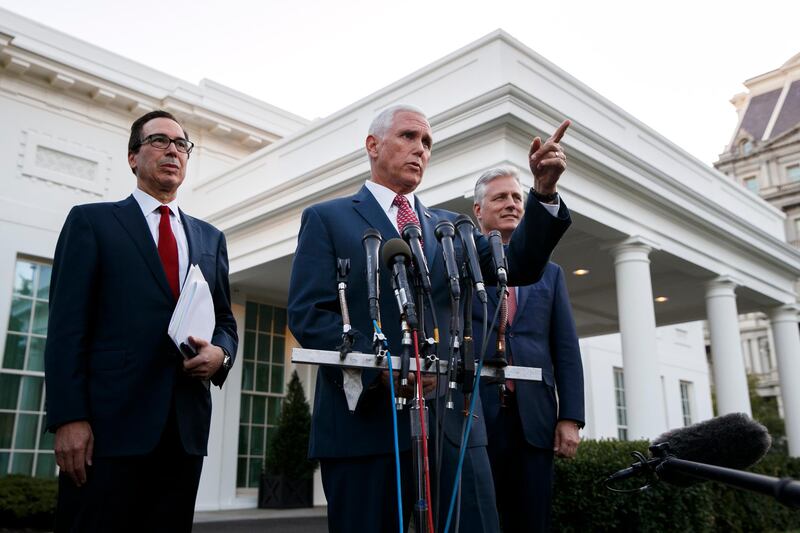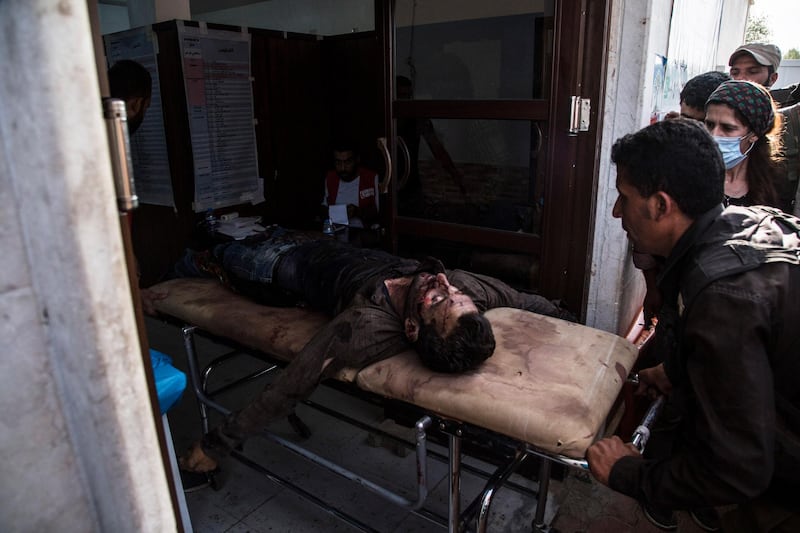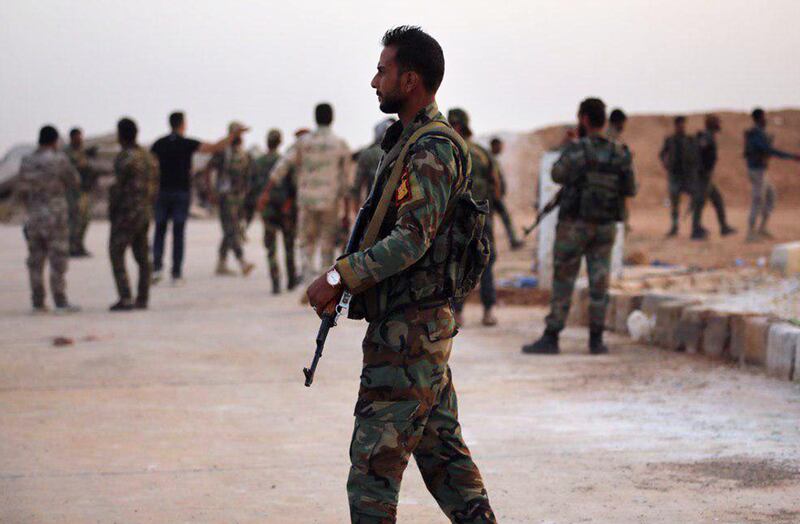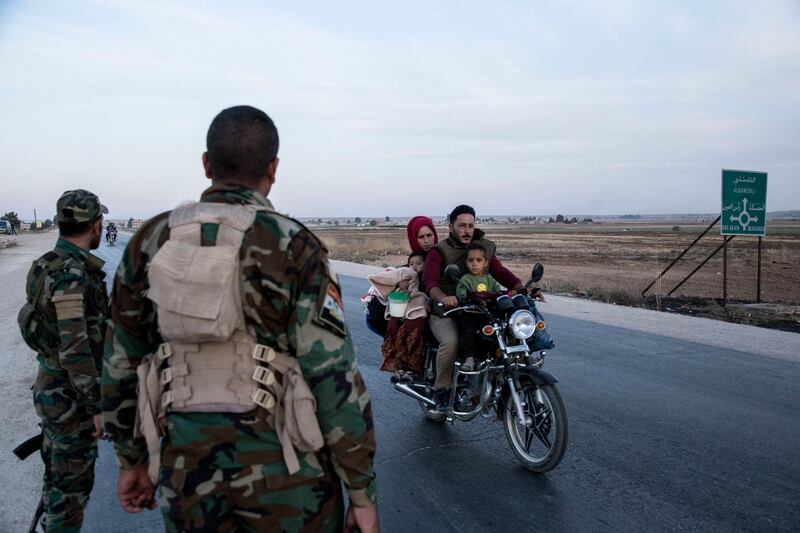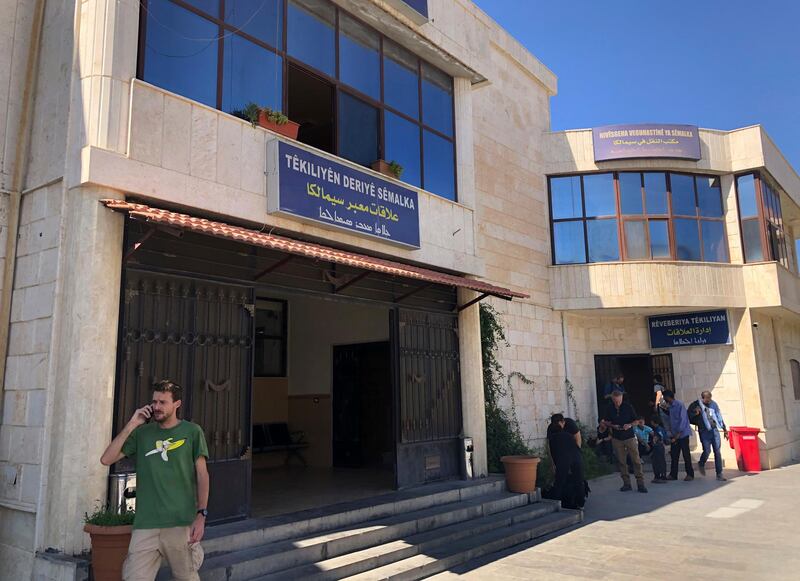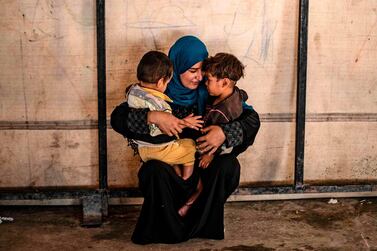Russian President Vladimir Putin and Turkish leader Recep Tayyip Erdogan on Tuesday discussed the need to prevent conflict between the Turkish and Syrian military, hours after the Assad regime took control of the border town of Manbij.
Mr Erdogan will visit Mr Putin "in the coming days", a Russian broadcaster said.
During Mr Putin's visit to Abu Dhabi earlier on Tuesday, his envoy for Syria indicated Moscow wanted Ankara to finish its offensive soon.
"We didn't agree with the Turks' questions about their presence in Syria and we don't approve of their actions," envoy Alexander Lavrentiev said.
Mr Lavrentiev called Turkey's military incursion into north-east Syria "unacceptable" and said the operation had to be limited in time and scale. It was a rare attack that suggests Moscow's patience with Ankara was wearing thin.
Earlier on Tuesday, Syrian regime forces took the city of Manbij, hours after US troops pulled back from the symbolically important border area.
"The Syrian government army has full control over the city of Manbij and nearby settlements," the Russian Defence Ministry said on Tuesday.
The news of the Assad regime's recapture in north-east Syria came after US President Donald Trump demanded that Mr Erdogan call a truce in Syria.
But the Turkish president dismissed this request in comments published in Turkish media early on Wednesday, where he said Ankara "can never declare a ceasefire" in northern Syria.
"They tell us 'to declare a ceasefire'. We can never declare a ceasefire," Mr Erdogan said on a flight back from Azerbaijan, the Hurriyet daily reported.
US Vice President Mike Pence said on Monday that Mr Erdogan promised Mr Trump his troops would not attack the border town of Kobane, the site of ISIS's first defeat in a 2015 battle with US-backed Kurdish fighters.
“President Trump communicated to him very clearly that the US wants Turkey to stop the invasion, implement an immediate ceasefire and to begin to negotiate with Kurdish forces in Syria to bring an end to the violence,” Mr Pence said.
Mr Pence and Secretary of State Mike Pompeo will travel to Ankara on Wednesday to press Turkey for a ceasefire.
Mr Trump’s demand was bolstered by US sanctions against Turkish ministries and government officials, and came a week after he announced US troops would be withdrawn from north-east Syria.
That prompted a Turkish invasion of north-east Syria and a confrontation with Kurdish troops, forcing more than 160,000 people to flee their homes.
By Tuesday afternoon, US troops had fully withdrawn from Manbij, said a spokesman for Operation Inherent Resolve, an 81-member coalition created to defeat ISIS across Syria and Iraq.
They were replaced by Syrian regime and Russian forces under a deal in which government troops moved to Kurdish-controlled areas in Syria's north to fend off Turkey's invasion.
Mr Erdogan insists Manbij, to the west of the Euphrates River, “belongs to the Arabs”.
The town has been under the control of Kurdish forces since they drove ISIS from it in 2016. ISIS captured Manbij in 2014.
Turkey-backed Syrian fighters said they would continue their advance towards Manbij, and said the troops that had entered were mostly Kurdish fighters now allied with the government.
A US official said the 1,000 troops being withdrawn from the area would be posted to Iraq, Kuwait and possibly Jordan. Some US troops are west of the town of Ain Issa, in the north of Syria.
Earlier on Tuesday, the US military sent F-15 fighter jets and Apache gunships in "a show of force" to disperse Turkish-backed forces who came "very close" to American troops in west Ain Issa, a US official told Fox News.
The Pentagon logged a formal complaint with the Turkish military after the incident.
The American Special Operations forces were joined by Syrian Kurdish allies during the encounter, which took place on Tuesday night, the official added.
Russia is a key ally of President Bashar Al Assad and launched a military intervention in 2015 in support of his forces.
The Defence Ministry said Russian forces were continuing to patrol border areas along the line of contact between Syrian and Turkish units.
Video on social media showed US military vehicles passing Russian lorries moving in the opposite direction.
“Co-operation has been organised with the Turkish side,” the ministry said.
Mr Lavrentiev said earlier on Tuesday that Russia would not allow clashes between Turkish and Syrian forces.
“This would simply be unacceptable and therefore we will not allow it, of course,” he said.
He said Turkish and Syrian officials were in contact to avoid any conflict.
“Negotiations are taking place in real time,” Mr Lavrentiev said.
Many of Turkey’s Nato allies condemned the incursion and are scheduled to meet today to discuss the issue.
Nato has a system for allies to officially request consultations when they feel their territories may be endangered by the actions of another member.
The alliance's Secretary General, Jens Stoltenberg, said yesterday that “many Nato allies have expressed strong criticism” of Turkey, which has the second biggest army in the 29-country alliance after the US.
Apart from today’s discussion among Nato ambassadors in Brussels, Mr Stoltenberg said the issue would be tackled at a meeting of defence ministers at the alliance’s headquarters next week.
He and British Prime Minister Boris Johnson agreed the Turkish incursion must end.
“The Prime Minister and Secretary General both expressed their deep concern at the situation in northern Syria,” a Downing Street spokeswoman said after the pair met in London yesterday.
“Both leaders stressed the value of Turkey as a Nato ally and recognised the role it has played in supporting refugees from the Syrian conflict.
“But they were clear that the current Turkish operation needed to end.”
After days without substantive comment, the UK suspended arms exports to Turkey in response to the incursion, joining Finland, Germany, France, Norway and the Netherlands.
“Military arms to Turkey that might be used in this operation have been suspended subject to the review that will take place,” British Foreign Secretary Dominic Raab said.
Mr Raab said the UK would consider the return of minors and orphans from camps holding ISIS fighters and their families.
The UN said yesterday that the reported summary executions of civilians, including Kurdish politician Hevrin Khalaf, in north-east Syria carried out by pro-Turkish fighters could amount to a “war crime” and that Ankara could be “deemed responsible”.
The UN rights office said its staff had seen two videos “showing what appear to be summary executions carried out by fighters belonging to the Ahrar Al Sharqiya armed group, which is affiliated with Turkey, on October 12".
Spokesman Rupert Colville said the footage, widely shared on social media, appeared “to show the fighters filming themselves capturing and executing three Kurdish captives” on a main road.
“Turkey could be deemed responsible as a state for violations committed by their affiliated armed groups, as long as Turkey exercises effective control over these groups, or the operations in the course of which those violations occurred," Mr Colville said.
He called for Ankara to find and arrest those responsible.
